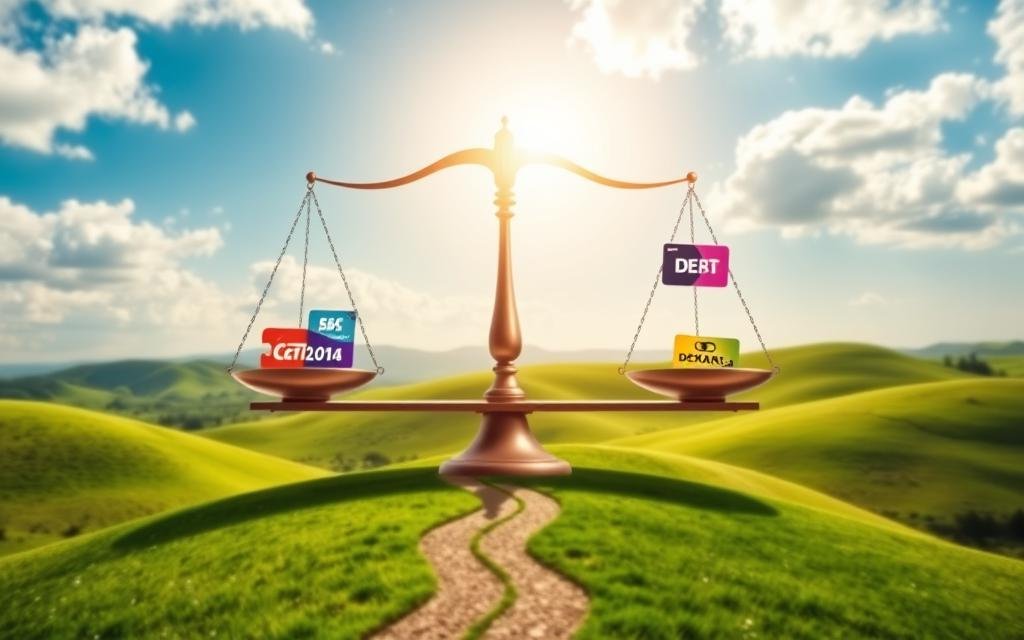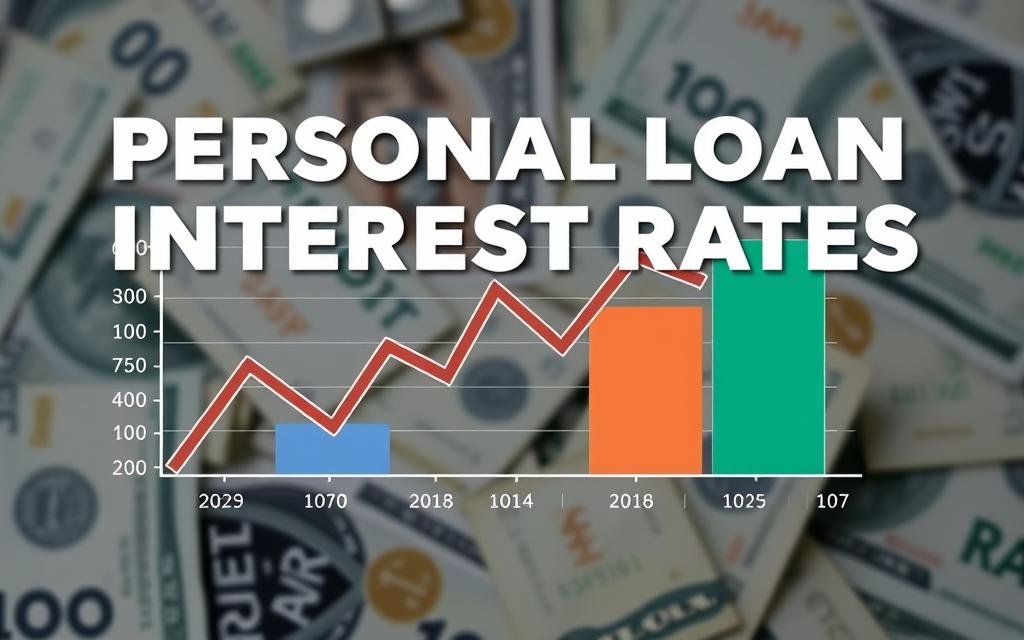Personal Loan vs Credit Card: Which Is Better for You?

When it comes to managing our debt, we often wonder if a personal loan or a credit card is better. Credit card debt in the U.S. hit $890 billion in Q1 2020. This choice can greatly affect our financial health. We'll look at the main differences between personal loans and credit cards to help you decide what's best for you.
The world of finance can seem complex and scary. But don't worry, we're here to help. We'll guide you through the options, so you can make a choice that's right for your future. Whether you want to combine your debts or need money for something specific, knowing the differences between personal loans and credit cards is crucial.
- Understanding the Key Differences Between Personal Loans and Credit Cards
- Current Average Interest Rates and Cost Comparison
- Personal Loan vs Credit Card: Making the Right Choice for Debt Consolidation
- Benefits of Using Personal Loans for Debt Management
- Advantages of Credit Cards for Financial Flexibility
- When to Choose a Personal Loan Over a Credit Card
- Hidden Fees and Charges to Consider
- Impact on Your Financial Future
Understanding the Key Differences Between Personal Loans and Credit Cards
Personal loans and credit cards have their own benefits. Knowing the differences can help you make smart financial choices.
Interest Rate Structures
Personal loans usually have a fixed interest. This means the rate stays the same for the whole loan. Credit cards, however, have variable APRs that can change. This can lead to higher interest costs over time.
Repayment Terms and Flexibility
Personal loans have set repayment plans, usually from one to five years. You pay the same amount each month. Credit cards offer more flexibility. You can pay the minimum, but this can extend your repayment time and increase interest.
Access to Funds
Personal loans give you a set amount of money upfront. This is good for big, one-time expenses. Credit cards, with revolving credit, let you use money as you need it. This is great for everyday or unexpected costs.
Knowing these differences helps you choose wisely between personal loans and credit cards. It depends on your financial goals and spending habits.
"Choosing the right financing option can have a significant impact on your overall financial well-being. Take the time to carefully evaluate the pros and cons of personal loans and credit cards to find the solution that best aligns with your needs."
Current Average Interest Rates and Cost Comparison
When looking at personal loans versus credit cards, knowing the interest rates is key. As of August 2024, credit cards average 23.37% interest, while personal loans average 12.33% for 24 months. This big difference can save you a lot of money over time.
Let's say you borrow $10,000. With a personal loan at 12.33% APR for 24 months, you'd pay about $1,160 in interest. But, if you use a credit card at 23.37% APR, you could pay up to $4,674 in interest over the same time. Choosing a personal loan could save you up to $3,514.
| Loan Type | APR | Loan Amount | Repayment Term | Total Interest Paid |
|---|---|---|---|---|
| Personal Loan | 12.33% | $10,000 | 24 months | $1,160 |
| Credit Card | 23.37% | $10,000 | 24 months | $4,674 |
Personal loan rates change based on your credit score, loan amount, and how long you take to pay it back. Those with great credit might get rates as low as 10.73%. But, those with poor credit could face rates up to 32.00%. It's crucial to compare and research to find the best deal and save money.
"When it comes to personal loans vs. credit cards, the interest rate difference can have a significant impact on your overall financial well-being. Choosing the right option can lead to substantial [interest savings] in the long run."
Personal Loan vs Credit Card: Making the Right Choice for Debt Consolidation
Debt consolidation can help simplify your finances and save money. When deciding between a personal loan and a credit card, several factors matter. These include your credit score, monthly payments, and the total cost over time.
Impact on Credit Score
Personal loans can lower your credit utilization ratio, which is key for your credit score. By combining multiple debts into one loan, you might boost your score. But, applying for the loan can temporarily lower it by a few points.
Monthly Payment Structure
Personal loans have fixed monthly payments, making budgeting easier. Credit cards, however, have flexible payments that can be unpredictable. This fixed payment structure is better for managing debt.
Total Cost Over Time
| Metric | Personal Loan | Credit Card |
|---|---|---|
| Average Interest Rate | 12.41% | 20.51% |
| Potential Savings | Up to $2,000 in the first year | Depends on balance transfer offers |
Choosing a personal loan can get you a lower interest rate than credit cards. This can save you a lot of money over time. You could save up to $2,000 in the first year.
When picking between a personal loan and a credit card for debt consolidation, think about several things. Consider how it affects your credit score, monthly payments, and the total cost. Understanding these factors helps you make a choice that fits your financial goals.
Benefits of Using Personal Loans for Debt Management
Personal loans can be a great tool for managing debt. They often have lower interest rates than credit cards. This can save you a lot of money over time.
One big advantage of personal loans is their fixed repayment schedule. This means you know exactly when you'll be debt-free. It helps you budget better and plan your finances more easily.
- Consolidate multiple debts into a single, fixed-rate loan with a predictable monthly payment.
- Potentially lower your overall interest costs by securing a lower rate compared to credit cards.
- Improve your credit score by diversifying your credit mix and demonstrating responsible credit behavior through on-time payments.
Personal loans do have fees, like origination fees and late payment penalties. But, the savings from lower interest rates and faster debt repayment can be worth it. Used wisely, a personal loan can be a big help in managing your debt.
| Average Interest Rates | Personal Loans | Credit Cards |
|---|---|---|
| As of October 2024 | 12.43% | 20.55% |
To make the most of a personal loan for debt consolidation, you need to make your payments on time. This not only saves you money on interest but can also improve your credit score. It's a step towards a better financial future.
Advantages of Credit Cards for Financial Flexibility
Credit cards offer many benefits that help with financial flexibility. They reward loyal users and have interest-free periods. This makes managing your money easier.
Rewards Programs
Today's credit cards have rewards programs. You can earn cash back, travel points, or other perks for your daily buys. For instance, the Citi Rewards+ Card gives ThankYou® Points for supermarket and gas station purchases. You can use these points for statement credits or travel.
Zero Percent APR Offers
Credit cards often have 0% APR offers for new purchases or balance transfers. These deals can last from 6 to 18 months. They help make short-term debt cheaper and easier to pay off.
Purchase Protection
Many credit cards offer extra protection, like Citi's $0 Liability for unauthorized purchases. The Consumer Credit Act also helps with recovering funds for purchases between $100 and $30,000. These protections give you confidence when using your credit card.
Using credit cards wisely can bring more financial flexibility. Enjoy the rewards, introductory offers, and protection they offer. But always pay off your balance on time to avoid interest and keep your credit score healthy.
When to Choose a Personal Loan Over a Credit Card
Choosing between a personal loan and a credit card can greatly affect your finances. Both have benefits, but personal loans are better in some cases.
Personal loans are great for large expenses or debt consolidation. They often have lower interest rates than credit cards. In August 2024, personal loans had an average rate of 12.33%, while credit cards were at 21.76%.
For those with high-interest credit card debt, personal loans are a smart choice. They can save you a lot of money in interest. For instance, a 13% personal loan can save you $67 monthly and $2,428 in interest on a $15,000 debt at 22% APR over three years.
Personal loans also offer a fixed repayment plan. This is good for those who like knowing exactly how much to pay each month. It helps avoid the temptation of credit card debt.
In summary, if you have large expenses or want to consolidate your debt at lower interest rates, a personal loan is a better choice. Their fixed repayment and potential savings make them more beneficial in some financial situations.
When looking at personal loans and credit cards, hidden fees can add up fast. Origination fees and late payment penalties are key to understanding the total cost. Knowing these fees helps you make a smart choice.
Origination Fees vs. Annual Fees
Personal loans usually have origination fees, from 1% to 10% of the loan. Credit cards, on the other hand, might have annual fees. These fees can range from $50 to over $500, depending on the card's perks.
Late Payment Penalties
Personal loans have fixed late fees, while credit cards can raise your interest rate. Missing payments hurts your credit score. It's vital to handle your money well.
| Feature | Personal Loan | Credit Card |
|---|---|---|
| Origination/Annual Fees | 1% to 10% of loan amount | $50 to over $500 |
| Late Payment Penalties | Fixed late fees | Penalty APR, increased interest rates |
Understanding these fees and hidden credit card charges helps you choose wisely. By looking at fee structures and penalties, you can avoid extra costs. This keeps your finances healthy for the future.
Impact on Your Financial Future
Choosing between a personal loan and a credit card can shape our financial future. Both have benefits, but they affect our credit score and borrowing power differently. It's important to think about these effects when planning for the long term.
Personal loans impact our credit score, with 35% based on payment history. Paying on time can boost our credit, helping us get better loans in the future. Plus, personal loans often have lower interest rates, which can save money, especially for consolidating debt.
Credit cards, however, offer more flexibility with rewards and zero-percent APR deals. But, it's key to use them wisely to avoid high interest and fees. Knowing how each choice affects our credit and debt can help us make better financial decisions for the future.
If you want to know other articles similar to Personal Loan vs Credit Card: Which Is Better for You? You can visit the category Loan.



Deja una respuesta